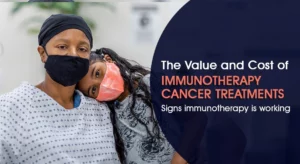Immunotherapy and pain
Yes but to a minor extent which is surely manageable, immunotherapy treatment can be painful
First to start with the process of infusing immunotherapy drugs into the patient body through the skin causing a painful reaction at the needle site. And as the immunotherapy kicks in, it might cause pain and inflammation in other areas or organs of the body;
This persists for weeks or months after treatment has started.
Why is immunotherapy painful?
Talking about the pain experienced- first let me mention that the pain is experienced felt differently by every individual
And in the case of immunotherapy when is being administered, it is called an infusion reaction.
This infusion reaction is a strong response to treatment by the body.
That means the immune system is recognizing the immunotherapy as a foreign substance at this time and trying to fight it off, resulting in painful skin reactions.
Once administered, immunotherapy boosts the immune system to better target cancer cells.
But in the process of targeting these abnormal cancer cells, your immune system also confuses and attack healthy tissue in error. Areas such as the skin, chest, abdomen, joints and eyes can all experience inflammation and pain as a result is accepted
For more info. on how immunotherapy works read: How does immunotherapy work for cancer treatment?
Types of pain in Immunotherapy:
- Injection site pain and skin reactions: can occur right after treatment is administered, most common side effect of intravenous immunotherapy.
- Other than immediate infusion reactions, immunotherapy can also cause redness, blistering, dryness and painful sores on the skin. These types of reactions manifest 2 to 3 weeks after treatment.
- Inflammation around the nails and fingertips can make dressing and other daily activities difficult and painful.
- Mild skin reactions are treated with creams, ointments and oral antihistamines.
- More severe cases may require immunotherapy to be stopped or the use of oral steroids.
- Anything more serious may necessitate intravenous steroids along with immunotherapy discontinuation.
- In rare cases, severe skin reactions such as Stevens-Johnson syndrome or toxic epidermal necrolysis may occur, which require a hospital stay.
- Abdominal pain as colon may become inflamed, causing severe stomach-area pain or cramping.
- Diarrhea, colitis and hepatitis may come along with the pain.
- Diarrhea occurs in over half of patients treated with CTLA-4 inhibitors, a type of immunotherapy.
- Abdominal pain typically begins 5 to 10 weeks after the first immunotherapy infusion. Initially, abdominal pain requires managing underlying diarrhea. And in case becomes severe, immunotherapy may be stopped until symptoms im: prove.
- Muscle aches: inflammation caused by immunotherapy can cause joint or muscle pain. Also can sometimes degenerate into a disease called arthritis.
- Chest pain: Inflammation in the lungs can cause a cough, which can lead to chest pain.
Pain management options
Pain medication plays a key role Other complementary therapies available to control pain include treatments such as:
- Breathing and meditation
- Distraction with enjoyable activities
- Hot and cold compresses
- Gentle therapeutic massage
- Acupuncture
- Biofeedback
- Physical or occupational therapy
Director Medical Oncology BLK super speciality hospital
DNB (Medical Oncology) – Rajiv Gandhi Cancer Institute & Research Centre (RGCI & RC), New Delhi
MD (Medicine) – Maulana Azad Medical College (MAMC), New Delhi
MBBS – Maulana Azad Medical College (MAMC), New Delhi
ESMO Immuno Oncology Preceptorship, Geneva
ESMO Neuroendocrine Tumor Preceptorship, Singapore
Immuno-oncology training from MD Anderson
Cancer Centre, Houston- USA ¬ European Certified
Dr Sajjan Rajpurohit is a renowned and esteemed international Medical Oncologist or Cancer Specialist Doctor based In Delhi NCR with 17plus years of experience and has treated more than 94000 cancer patients- still serving humanity with pride.
Also read:
How Pain Management In Cancer Patients Is Challenging Due To Lack Of Communication




